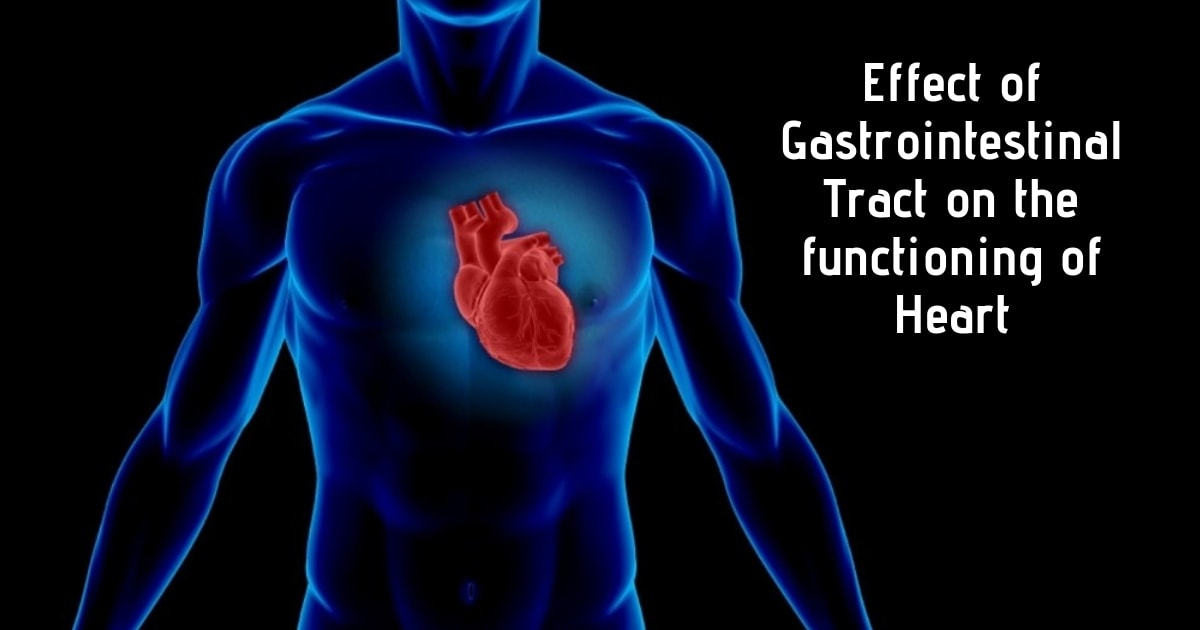Effect of GIT on the functioning of Heart
The Gastrointestinal tract affects every organs of the body and heart is no exception. In fact, stomach, one of the main organs of the gastrointestinal tract is popularly referred to as second brain. It is said that stomach indirectly controls the brain and hence other organs too. So how does the GI tract get to control heart?
Heart Rate
Heart rate or pulse is an important factor in determining the health of the heart. The most popular method of reading the pulse is to check it at your wrist. When we place two finders (the index and the third finger) over the radial artery in the wrist region, precisely between the bone and the tendon, we could feel the pulse of the heart. As we feel our pulse, we should start counting the pulse for 60 seconds. The value derived is heart rate or beats per minute. The normal resting heart rate for adults ranges (for all practical purposes) from 60-80 beats per minute. A lower resting heart rate is considered healthy. Foods that are too cold or hot when goes inside the stomach can cause a sudden fluctuation in heart rate.
Effect of Hypoglycemia on Heart Rate
- What we eat and when we eat can determine the heart rate. On a normal day, if we are skipping a meal unusually, we feel hungry and start going crazy. It leads to a decrease in the blood sugar level and the condition is termed as Hypoglycemia. This condition increases heart rate.
Effect of Stress Hormone on Heart Rate
- When our blood has low blood sugar level, stress hormones like cortisol are also released to induce hunger. This stress hormones too contribute to an increased heart rate.
Effect of Hunger on Heart Rate
- This is just the opposite of hypoglycaemia. If we are fasting for few days or not having food due to scarcity or famine, then the body senses the same and starts slowing the heart rate. This response is to slow the metabolism of the body which is aimed at conserving energy.
Effect of Metabolism on Heart Rate
What we eat has a bearing on metabolism of the body. It is said that approximately 10% of calories we eat are spent on digestion process itself. This is called the thermic effect of the food. Different foods require different calories to get itself digested. Fibrous vegetables and fruits approximately need 20% of their calories for getting digested. Protein-filled foods burn 30% of their calories just for getting digested. It is very low when it comes to fat and carbohydrate.
- The more the thermic effect of food, the higher is the metabolism and normal or lower is the heart rate. When the thermic effect of the overall food consumed is very less, then such foods get digested easily and the metabolic rate becomes slower over a period of time.
- A sluggish metabolism leads to fat deposition and becoming obese eventually increases the heart rate.
Effect of Incretin on Heart Rate
Incretin hormones help in the secretion of insulin which controls the sugar level in the blood. Increasingly, research point to the fact that incretin hormones are better secreted when they sense the glucose arrival from the GI tract than through the insulin injections in diabetes patients. This indirectly means that healthy food arriving through GI tract can not only control blood sugar but also can help regulate the heart rate as a result.
Effect of Food on Heart Health
- When our food has unhealthy saturated fat or trans-fat content in it, they lead to arterial plaque. This can have detrimental effect on the health of the heart as it can lead to heart attack eventually if the plaque starts blocking the blood flow to the heart.
- People with cardiac problems should desist from having heavy meals. They should neither walk nor exercise after they have their food. This is because blood supply goes to the the intestine for digestion purposes. When they walk or strain themselves with exercises, then blood supply needs to go to the respective muscle group too. This puts heavy burden on the already strained heart.

